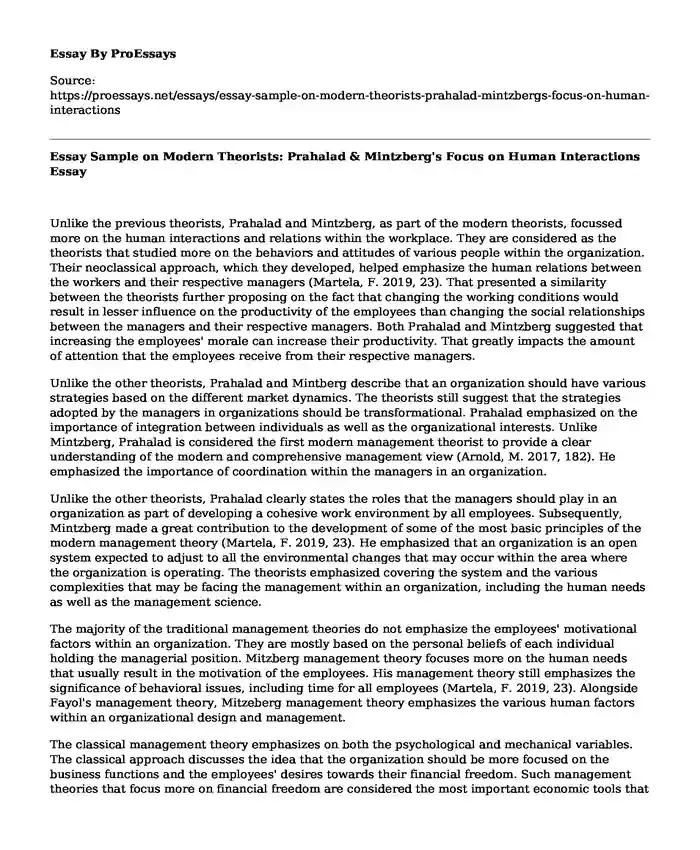Unlike the previous theorists, Prahalad and Mintzberg, as part of the modern theorists, focussed more on the human interactions and relations within the workplace. They are considered as the theorists that studied more on the behaviors and attitudes of various people within the organization. Their neoclassical approach, which they developed, helped emphasize the human relations between the workers and their respective managers (Martela, F. 2019, 23). That presented a similarity between the theorists further proposing on the fact that changing the working conditions would result in lesser influence on the productivity of the employees than changing the social relationships between the managers and their respective managers. Both Prahalad and Mintzberg suggested that increasing the employees' morale can increase their productivity. That greatly impacts the amount of attention that the employees receive from their respective managers.
Unlike the other theorists, Prahalad and Mintberg describe that an organization should have various strategies based on the different market dynamics. The theorists still suggest that the strategies adopted by the managers in organizations should be transformational. Prahalad emphasized on the importance of integration between individuals as well as the organizational interests. Unlike Mintzberg, Prahalad is considered the first modern management theorist to provide a clear understanding of the modern and comprehensive management view (Arnold, M. 2017, 182). He emphasized the importance of coordination within the managers in an organization.
Unlike the other theorists, Prahalad clearly states the roles that the managers should play in an organization as part of developing a cohesive work environment by all employees. Subsequently, Mintzberg made a great contribution to the development of some of the most basic principles of the modern management theory (Martela, F. 2019, 23). He emphasized that an organization is an open system expected to adjust to all the environmental changes that may occur within the area where the organization is operating. The theorists emphasized covering the system and the various complexities that may be facing the management within an organization, including the human needs as well as the management science.
The majority of the traditional management theories do not emphasize the employees' motivational factors within an organization. They are mostly based on the personal beliefs of each individual holding the managerial position. Mitzberg management theory focuses more on the human needs that usually result in the motivation of the employees. His management theory still emphasizes the significance of behavioral issues, including time for all employees (Martela, F. 2019, 23). Alongside Fayol's management theory, Mitzeberg management theory emphasizes the various human factors within an organizational design and management.
The classical management theory emphasizes on both the psychological and mechanical variables. The classical approach discusses the idea that the organization should be more focused on the business functions and the employees' desires towards their financial freedom. Such management theories that focus more on financial freedom are considered the most important economic tools that emphasize maximizing remuneration. Fayol's management theory focuses on the idea that the employees should always be focused on meeting the company objectives. Similarly, Prahalad's management theory focuses on the idea that the management within an organization should focus more on the impersonal and autocratic style whether the relationship between the managers and their employees should always be kept formal.
Brech management theory emphasizes that an organization should use a democratic management style. That means that the human relations within the organization should be informal. That means that an organization should have an organistic organizational structure. Additionally, while his management theory is focussed on the rational economic view, the majority of the other management theories are focussed on the social person view (Davis, K. 2016, 487). Brech management theory focuses on the complications linked to the management of employees within an organization as well as their diverse needs. The management theory indicates that every organization is complicated in its way, and it comprises of employees with diverse needs.
Conclusion
Both Hamel and Heller management theories are similar to how they develop different approaches to be used in management and designing the systems approach within an organization. Such systems developed by both Hamel and Heller provide the managers with a better understanding of the workplace management.
Cite this page
Essay Sample on Modern Theorists: Prahalad & Mintzberg's Focus on Human Interactions. (2023, Sep 17). Retrieved from https://proessays.net/essays/essay-sample-on-modern-theorists-prahalad-mintzbergs-focus-on-human-interactions
If you are the original author of this essay and no longer wish to have it published on the ProEssays website, please click below to request its removal:
- Mahatma Gadhi Leadership
- Understanding and Controlling Teenage Suicide
- Administrative and Teacher Preparation Programs Essay Example
- Prosecutor's Information Management System - Research Paper
- Laws on Food: Food Regulations Essay Example
- Essay Example on High Performance Leadership: The Managerial Grid of Bill Gates
- Summary of a Journal Article - Free Essay Example







